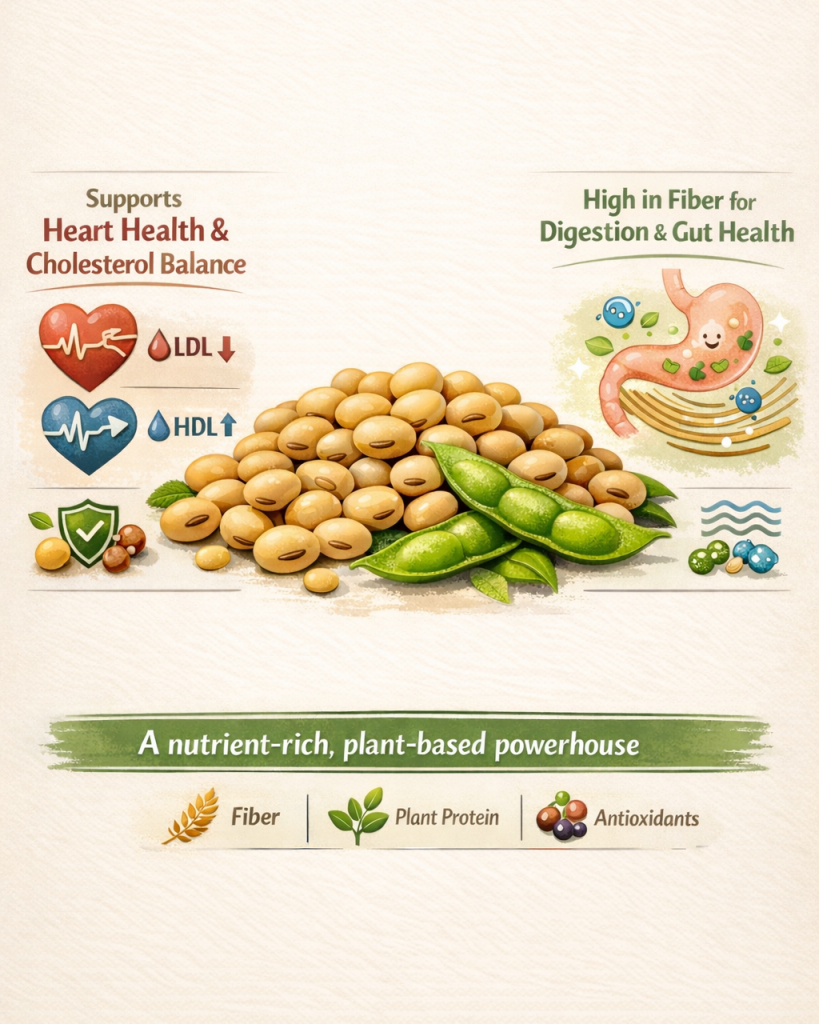Organic soybeans have become a staple in the world of health-conscious eaters and environmentally aware consumers. As a natural source of protein, these legumes cater to a wide audience, ranging from vegans to those simply seeking non-GMO options for their dietary needs. My appreciation for organic soybeans stems from their nutritional benefits and their versatility in the kitchen, allowing them to be transformed into a myriad of products, such as tofu, soy milk, and tempeh.

I understand the importance of sustainable agriculture, and organic soybeans play a significant role in this area. These soybeans, grown adhering to organic farming practices without synthetic pesticides or fertilizers, contribute to a healthier ecosystem and reduce environmental impact. The demand for these wholesome beans has seen a steady rise, not just for their health advantages, but also for the positive environmental implications of organic farming.
The Bigger Impact of Choosing Organic Soybeans
Organic soybeans offer far more than convenience or protein—they represent a thoughtful choice that supports both personal health and the environment. Nutritionally, they stand out as a complete plant-based protein, providing all nine essential amino acids in one whole food. Along with protein, they deliver fiber, antioxidants, and important minerals such as iron and calcium, all of which contribute to heart health, digestion, and long-term wellbeing. For vegetarians, vegans, and anyone reducing animal products, organic soybeans offer dependable nourishment without compromise.
What truly sets organic soybeans apart, though, is the way they are grown. Organic farming methods prioritize soil health, biodiversity, and reduced chemical use, creating a system that works with nature rather than against it. By choosing organic soybeans, consumers support agricultural practices that protect ecosystems, promote healthier farmland, and reduce environmental strain. From the food on your plate to the fields it comes from, organic soybeans represent a choice that benefits both people and the planet—making them a meaningful staple in a balanced, sustainable lifestyle.
The Rise of Organic Soybeans
In recent years, the production and popularity of soybeans have significantly increased, driven by consumer demand and the appeal of sustainability practices.
Understanding Organic Certification
I’ve learned that for soybeans to be labeled as “certified organic,” they must meet stringent guidelines set by organizations such as the USDA. This certification ensures that the soybeans are grown without the use of synthetic pesticides and fertilizers, are non-GMO, and adhere to practices that support natural soil fertility and biodiversity, such as crop rotation.
- Organic Certification Requirements:
- Non-GMO seeds
- No synthetic herbicides or pesticides
- Soil must be managed through natural processes
Advantages over Conventional Soybeans
One of the key benefits I’ve observed with organic soybeans is that they are often considered a healthier option due to the absence of chemical residues often found in conventional farming. Moreover, soybean farming practices, such as crop rotation, contribute to preserving the long-term health of the soil, making it a more sustainable choice for our environment.
- Advantages of Organic Soybeans:
- Health: Reduced exposure to synthetic chemicals for consumers
- Sustainability: Enhanced soil health and ecosystem biodiversity
By focusing on natural, environmentally friendly cultivation techniques, soybean fields promote a holistic approach to agriculture that benefits both the land and the people who consume these products.

Nutritional Profile of Organic Soybeans
Organic soybeans stand out for their rich nutritional composition, particularly their high protein content and abundance of essential minerals and antioxidants.
Protein and Essential Amino Acids
I find that organic soybeans are nutritional powerhouses when it comes to protein. They not only provide a complete protein source, which is rare among plants, but also contain all nine essential amino acids necessary for human health. A serving of soybeans can serve as a substantial contributor to the daily protein needs of an individual. Protein content in soybeans supports muscle growth and repair, making it a favored choice for vegetarians and vegans seeking plant-based protein options.
Minerals and Antioxidants
These legumes are notably rich in important minerals such as iron and calcium. Iron is crucial for oxygen transport in the blood, and calcium is imperative for bone health. In addition to these, organic soybeans offer a good amount of fiber, which aids in digestion and helps maintain a healthy gut.
Antioxidants are another key component found in organic soybeans. They play a vital role in protecting the body’s cells from damage caused by free radicals, thereby reducing the risk of certain chronic diseases. I would highlight that the photosystems coordination in soy plants, including the ability to adapt to various stresses, indicates a complex metabolism that could be linked to the production of beneficial compounds, such as antioxidants, in organic soybeans.
Culinary Uses of Organic Soybeans
In my experience with organic soybeans, I’ve found them to be a versatile and nutritious ingredient in a variety of dishes, essential in both vegetarian and vegan diets.
From Tofu to Tempeh
I often celebrate organic soybeans for their transformative nature in creating tofu and tempeh, both staples in my plant-based cooking. Tofu, coagulated from the curds of soy milk, is a chameleon in the kitchen, adept at absorbing flavors from savory stir-fries to sweet desserts. Tempeh, on the other hand, involves cultured soybeans that have a nutty flavor and firm texture, making it ideal for grilling or sautéing.
Cooking organic soybeans from scratch doesn’t have to be time-consuming. A high-quality pressure cooker like the Instant Pot Pro Plus makes it easy to prepare perfectly tender soybeans with minimal hands-on time—ideal for batch cooking, meal prep, and building nourishing plant-based meals around whole foods.

Instant Pot Pro Plus Wi-Fi Smart 10-in-1, Pressure Cooker, Slow Cooker, Rice Cooker, Steamer, Sauté Pan, Yogurt Maker, Warmer, Canning Pot, Sous Vide, Includes App with Over 800 Recipes, 6 Quart
- 10 Cooking Functions: Pressure cook, slow cook, sauté, steam, sous vide, can, make rice, yogurt, use NutriBoost for extra texture, or simply keep your meal warm—all in one appliance with intuitive touchscreen controls.
- Smart Guided Cooking: Pair with the Instant Connect App to explore 2,000 plus interactive recipes, complete with step-by-step instructions. Monitor progress, adjust settings, or switch functions—all from your phone, in real time.
- NutriBoost Technology: Pulses gently while cooking to mix ingredients, enhancing texture and flavor for perfect rice, soups, broths, and risotto.
- Safe, Easy and Silent Steam Release: WhisperQuiet technology minimizes noise for a peaceful kitchen, while the one-touch button or Instant Connect App lets you release steam effortlessly and safely.
Soy Milk and Beyond
Transforming organic soybeans into soy milk is another culinary art I admire. This lactose-free alternative is not just for drinking; it can be used in recipes ranging from creamy soups to decadent custards. Soy milk’s versatility extends to noodle dishes, where it infuses a rich, subtle taste, and in the creation of soy sauce, where fermented soybeans produce a condiment that’s become a cornerstone in my savory cooking.
If you’ve ever thought about making your own soy milk or blending organic soybeans into smoothies and soups, a high-performance blender is a game changer. A professional-grade Vitamix effortlessly transforms soaked organic soybeans into ultra-smooth soy milk, creamy sauces, and protein-rich blends—giving you complete control over ingredients while elevating your plant-based kitchen.

Vitamix 5200 Blender, Professional-Grade Blender for Smoothies, Soups, Ice Cream and More, Stainless-Steel Blades, Self-Cleaning Kitchen Appliance, 64 Oz Container, White
- Included: Vitamix 5200 blender motor base, 64-ounce classic container, and tamper; this kitchen blender container allows for small- to large-capacity blends
- 2 HP Motor: Equipped with a high-performance motor, this countertop blender lets you say goodbye to chunky smoothies and hello to effortless blends
- Stainless-Steel Blades: Laser-cut, stainless-steel blades can power through fibrous produce and frozen fruit, crush ice and nuts, and much more, offering consistent blends for years
- 64-Ounce Classic Container: The BPA-free blending container is designed to create the iconic Vitamix Vortex; it’s a professional-grade blender for smoothies, juices, purées, sauces, soups, and more, making hot and cold dishes in the container
Health Benefits and Dietary Importance
Soybeans offer a wealth of benefits that cater to heart health and improve digestion. They are a notable source of dietary fiber and antioxidants, which are essential for maintaining overall health.

Heart Health and Cholesterol
Soybeans are lauded for their positive impact on heart health, primarily due to their high content of fiber and antioxidants. Eating this legume helps reduce cholesterol, aiding in heart disease prevention. Studies suggest that diets rich in soy protein can reduce bad cholesterol (LDL) levels while potentially increasing good cholesterol (HDL).
Digestion and Gut Health
As for digestion and gut health, the dietary fiber in soybeans plays a crucial role. Fiber promotes regularity and gut health by nourishing beneficial bacteria as a prebiotic. Consuming soybeans may significantly enhance gastrointestinal function, making them a valuable addition to a nutrient-rich diet.
Sustainable Farming and Environmental Impact

Sustainable farming practices are critical in reducing the environmental footprint of agriculture. Organic soybean farmers use crop rotation and community engagement to grow sustainably with the ecosystem.
Crop Rotation and Soil Fertility
Crop rotation, a practice of altering crops in a sequence across a field, is a cornerstone in sustainable farming. I incorporate small grains into the rotation to break pest and disease cycles and to add diversity to the system. This method preserves soil fertility and cuts down on chemical use. Strategic crop rotation with legumes enriches soil, prepping it for organic soybeans and future harvests. Research has shown that the proteins in organic soy want to be as bioavailable as the conditions allow.
Supporting Local Communities
In sustainable agriculture, the role of partners and the community is paramount. My efforts include working with local businesses and farmers to create a robust network that bolsters economic and environmental resilience. By choosing organic soybeans, consumers support farming practices that minimize negative impacts on the environment. Media coverage often highlights the environmental advantages of buying local, and by engaging with local media, I aim to educate the public about the benefits of organic farming. I offer sustainable products and bolster my region’s socioeconomic wellbeing—true community support is reciprocal.
Frequently Asked Questions

Here, I’ll tackle FAQs on organic soybeans, covering nutrition, buying choices, prices, and unique traits.
What are the benefits of consuming organic soybeans?
Organic soybeans offer several health advantages, including being a source of folic acid, which is especially beneficial for pregnant women. Consuming organic soy-based products can contribute to the prevention of neural tube defects in infants.
How does the nutritional value of organic soybeans compare to non-organic soybeans?
Organic and non-organic soybeans generally have a similar nutritional profile, as they both contain essential amino acids, vitamins, and minerals. Many prefer organic soybeans, grown without synthetic pesticides or fertilizers, for their health and environmental benefits.
Where can I find organic soybeans for purchase in bulk quantities?
Suppliers specializing in organic products often offer organic soybeans in bulk quantities. Entities such as Pork Business discuss importation and might provide leads on such suppliers.
What should I look for to ensure I’m buying true non-GMO organic soybeans?
When searching for true non-GMO organic soybeans, it’s essential to look for certification labels like USDA Organic and Non-GMO Project Verified. These certifications indicate the soybeans meet strict standards for organic farming and genetic purity.
Are there price differences between conventional and organic soybeans, and why?
Yes, organic soybeans typically come at a higher price than conventional ones. This difference is due to factors like the more labor-intensive organic farming practices and the typically lower yields, compared to conventional farming.
What are the differences, if any, between soya beans and soybeans in the context of organic farming?
In the context of organic farming, ‘soya beans’ and ‘soybeans’ refer to the same legume and have no inherent differences. In British English, people more commonly use ‘soya beans,’ while ‘soybeans’ is the preferred term in American English.
For those who want homemade soy milk without the extra steps, an automatic soy milk maker offers both convenience and consistency. The Soyabella transforms organic soybeans into fresh soy milk at the touch of a button—no straining, no stovetop cooking—making it easier than ever to enjoy additive-free, organic soy milk at home.

Tribest Soyabella SB-130 Deluxe Automatic Nut Milk Maker & Soy Milk Maker Machine, White/Stainless Steel
- Electric Milk Maker: Soyabella milk maker machine makes fresh and heated soy milk, almond milk, rice milk, and cashew milk in just 15 minutes and unheated, raw plant-based milk in as little as 30 seconds
- Versatile Grinding Function: The grinding blades of this soy milk maker grind coffee beans, flax seeds, spices, and other dry ingredients to a smooth, light consistency with their patented helical structure and serrated edge
- Temperature Control: This nut milk maker features different program settings that allow you to control temperature and grinding time with a single touch; built-in safety features prevent messes that can be caused by overflows, dry heating, or overheating
- Food-Safe Structure: Almond milk maker with stainless steel carafe, screens, and grinding blade with BPA-free motorhead ensures your beverages do not come in contact with harmful chemicals; no exposed heating coil makes it easy to clean
A More Sustainable Choice
Organic soybeans show the power of sustainable farming. They nourish people while protecting the planet. Choosing organic soy supports soil health, biodiversity, and local communities. As awareness grows, demand for organic soybeans will continue to rise. This superfood supports more than personal wellness. It represents a conscious step toward a resilient food system. When you choose tofu, tempeh, or soy milk, you’re not just eating well—you’re supporting a healthier future.
Beyond nutrition, organic soybeans reflect a shift toward more mindful food choices. They connect everyday meals to long-term environmental stewardship, proving that small decisions at the table can help shape a more balanced and sustainable food system.

*We may earn a commission for purchases made using our links. Please see our disclosure to learn more.



